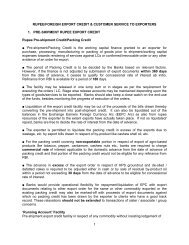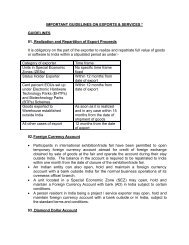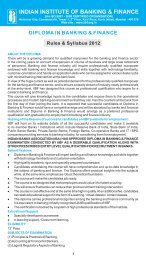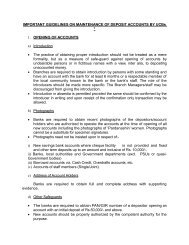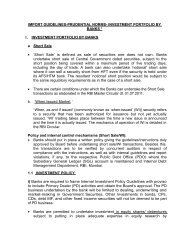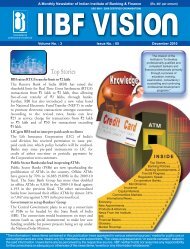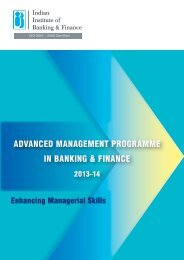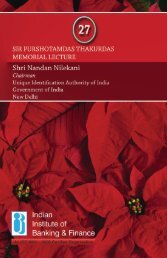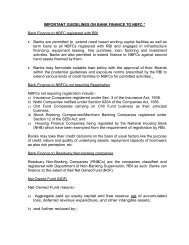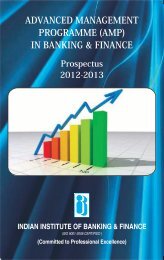Create successful ePaper yourself
Turn your PDF publications into a flip-book with our unique Google optimized e-Paper software.
special featurebusiness-like smile. Bankers will do well to wear awarm smile as part of their dress-code. Customerswant to be listened to, understood and empathizedby the bankers. If they are taken care of, they will,in turn, take care of the business of the banks!Their problems are important for them, though theymay appear insignificant to the banker. The bankershould respond to the customers' issues and providecomfort.Dissemination of financial literacy and productfeatures :Customers do not want jargons or high-profileterminology. They want to understand the bankingproducts and services in a simple way. The bankersshould illustrate, for example, what is a fixed depositand what is a re-investment deposit, what isthe mechanism of Equated Monthly Instalment(EMI), what is the difference between flat rate andinterest rate on monthly reducing balance, what arethe implications of a loan product quoted in floatinginterest rates. The customers also need to be toldabout the products which are suitable for them.SME borrowers need to be told patiently about thevarious facilities offered by different agencies fortheir uplift. Most of the borrowers require financialliteracy rather than finance per se. Bankers have avital role to play as financial advisors to thecustomers. Banks also need to retain their existingcustomers; when new customer-base is createdwith the technology, there should not be a drain of theexisting customer-base.Banks and Corporate Social Responsibility (CSR) :National level initiatives such as Financial Inclusionand Government sponsored loan schemes for ruraland urban poor to uplift people {living below thePoverty Line (BPL)} above the Poverty Line, cansucceed with the pro-active participation of banks.Similarly, the country can witness a second Greenrevolution when agriculture and allied activities arefinanced by banks. Borrowers engaged in agricultureand allied activities and the SME sector, need constantcounseling. They need bankers to act as a bridgebetween them and the other nodal agencies. Banks alsoneed to leverage the core-competencies of variousagencies-Government and non-government, to reachand teach the poor and the downtrodden.Conclusion :New-age banking is welcome if it can be complementedand supplemented by the core-customer servicevalues that will impact all segments of the society.Technology should not distance the banker fromthe customer. On the other hand, technology andhuman values should go hand in hand and work intandem. In that scenario, the banks will contributetheir best towards nation's growth.Recommendations of the Working Group on Securing Card Present TransactionsA Working Group was constituted by the Reserve Bank on March 31, 2011 for recommending measures to secure all CardPresent (CP) transactions. The Group, which submitted its report on May 31, 2011, made inter alia the following recommendations :(a) The technology and payment infrastructure like implementation of Unique Key Per Terminal (UKPT) and Terminal LineEncryption (TLE) should be strengthened within 18-24 months; (b) An additional factor (Personal Identification Number (PIN) orBiometric) for all domestic debit card transactions should be introduced within 24 months; (c) After monitoring the progress madein the roll-out of Aadhaar UID, it may be considered to use the biometric finger-print capture in lieu of PIN at the ATM and PoSfor 18 months; (d) Based on the above recommendations, a decision should be taken to introduce Euro pay Master Card Visa(EMV) Chip and PIN for credit cards and debit cards for all domestic transactions within five and seven years, respectively; (e) EMVChip Card and PIN should be issued in lieu of Magstripe cards when at least one purchase is evidenced at an overseas location.The Report was placed on the RBI website for public comments. The recommendations of the Group have been accepted by theBank and appropriate directions have been issued in September 2011.Source : Report on Trend & Progress of banking in India, 2010-11, RBI28October - December 2011The Journal of Indian Institute of Banking & Finance



